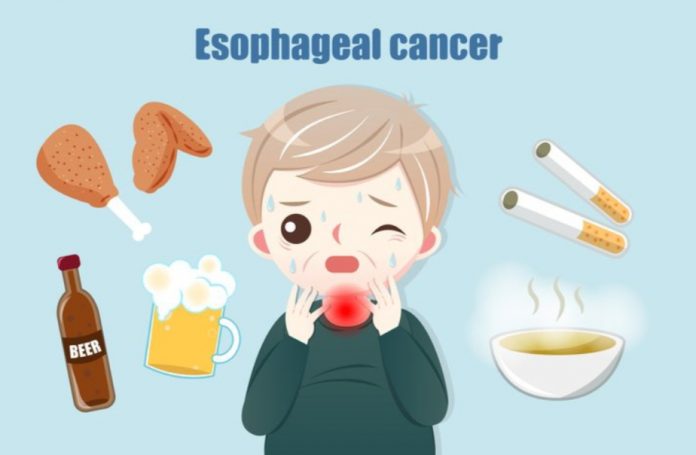Cancer is one of the most dangerous diseases in the world. It can be life-threatening. Esophageal cancer is not as common as other cancers, but it can also cause severe health problems like any other cancer.
In this article, Dr. Sandeep Nayak talks about esophageal cancer treatment in Bangalore.
Table of Contents
What is Esophageal Cancer?
The esophagus is a muscular, hollow tube that moves food from the throat to the stomach. Esophageal cancer occurs when a cancerous tumor forms in the lining of the esophagus.
The tumor may affect the esophagus muscles and deep tissues if the tumor grows. Cancer can occur anywhere in the whole length of the esophagus, including the meeting point of esophagus and stomach.
Dr. Sandeep Nayak is one of the best surgical oncologists providing esophageal cancer treatment in Bangalore. He has years of experience in delivering the best esophageal cancer treatment.
Types of Esophageal Cancer
There are 2 types of esophageal cancer:
- Squamous cell carcinoma: This cancer happens when cancer begins in the flat, thin cells that make up the esophageal lining. This kind is most commonly found near the top or center of the esophagus, but it can occur elsewhere.
- Adenocarcinoma: This type of cancer happens when cancer begins in the epithelial cells responsible for producing fluids such as mucus. Adenocarcinomas are most commonly found in the lower esophagus.
Read Also : What is PGT? PGT Types and Procedure in India
Symptoms
According to Dr. Sandeep Nayak, you would not notice any symptoms at the early stages of esophageal cancer. Though, as cancer progresses, you might experience the following symptoms:
- Loss of weight without trying
- Indigestion
- Vomiting
- Fatigue
- Chest pain
- Long-term cough
- Hiccups
- Food coming back up the esophagus
- Choking regularly while eating
- Difficulty or pain during swallowing
It is very important to seek treatment as soon as possible if you see any of these symptoms regularly.
Causes
As with many cancers, the cause of esophageal cancer is not precisely known.
Esophageal cancer occurs when cells in the esophagus develop mutations in their DNA. These mutations make the cells grow out of control.
The accumulated affected cells in the esophagus create a tumor, which can infect neighboring tissues and spread to other body regions.
Who’s at Risk of Developing Esophageal Cancer?
According to Dr. Nayak, people with the conditions or habits mentioned below could be at risk of developing esophageal cancer.
- Gastroesophageal reflux disease (GERD)
- Smoking
- Obesity
- Alcohol consumption
- Bite reflux
- Difficulty swallowing because the esophageal sphincter would not relax
- A continuing habit of drinking extremely hot liquids
- Less consumption of vegetables and fruits
- Getting radiation treatment for the upper abdomen or chest
Stages Esophageal Cancer
The following are the stages of esophageal cancer according to Dr. Nayak:
| Stage | Symptoms |
| 0 | Cancer has only recently begun to form and has not progressed beyond the lining of the esophagus. In this stage, there are usually minor or no symptoms. |
| I | Cancer has gone further into the esophageal tissues at this stage but has not yet damaged adjacent lymph nodes or organs.
|
| II | Cancer has spread to the deeper tissues of the esophageal wall and may have spread to nearby lymph nodes. |
| III | Cancer has spread beyond the esophageal wall and neighboring lymph nodes to surrounding tissues at this stage, although other organs have not yet been impacted.
People frequently complain of throat soreness and difficulties swallowing at this time. |
| IV | Cancer has spread to other areas of the body at stage IV. |
Treatment
Your doctor might recommend surgery if cancer has not spread to other areas of your body. They can recommend radiation therapy or chemotherapy as the best option.
This is done to shrink the size of the tumors in the esophagus. They can be removed easily with surgery due to the reduced size.
Surgery
Surgery is one of the most common treatments for esophageal cancer. It is done with a few little incisions and an endoscope. Your surgeon might perform the surgery if the tumors are small and have not spread to other body parts.
The surgeon might remove some or all the esophagus and surrounding tissue. The esophagus is reconstructed using the tissues from your stomach or large intestine.
In more severe cases, the surgeon might also remove some stomach parts.
Chemotherapy
Chemotherapy uses medications to attack cancer cells. It can be used before or after the surgery.
Chemotherapy has a few side effects because it can also kill your healthy cells and the cancerous ones.
The side effects of chemotherapy include:
- Nausea
- Hair loss
- Vomiting
- Pain
- Fatigue
Radiation therapy
As the name suggests, radiation therapy uses radiation to treat cancer. These rays are pointed towards the tumor to interfere with its division and growth.
Radiation can be used before the surgery to reduce the tumor size or after the surgery to kill the remaining cancer cells.
It can include some side effects like:
- Your skin looks sunburned.
- Difficulty or pain while swallowing.
- Fatigue
- Painful ulcers
You can visit Macs Clinic to get esophageals cancers treatment in Bangalore.
Prevention
There is no fixed way to prevent esophageals cancers, says Dr. Nayak, but you can take the following steps to lessen the risk:
- Avoid chewing tobacco and smoking cigarettes.
- Limit your alcohol consumption.
- Try to include as many fruits and vegetables in your diet as possible.
Conclusion:
If esophageals cancers is detected earlier, it can be treated successfully. But unfortunately, this cancer is not detected until it has progressed to a later stage, where it can be treated but not cured.
You can visit your doctor as soon as you see any symptoms related to esophageals cancers. If you can detect it earlier, it can be successfully cured.


















